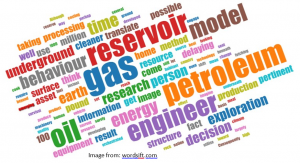by Jemimah-Sandra Samuel, PhD student in the Department of Earth Science and Engineering
My PhD in Under 500 Words
When people think about oil and gas, they think of climate change. But let us imagine for an instant that the exploration of oil and gas has no effect on the earth and its habitats, even more so the use of oil and gas products. Then surely, we will be looking out for better ways to harness its exploration and production. This is the basis for my research which is largely pertinent to developing countries where the means to engage cleaner energy technologies is still emerging, and or in developed nations where there is a current shift from oil towards a cleaner energy source (gas).
 People require gas to heat up homes, cook meals, and perhaps fuel vehicles. This gas comes from beneath the earth’s surface, from rock structures underneath the ground; reservoirs beyond human reach or possible survival. Consequently, to produce and utilise gas on earth’s surface, high-quality equipment and machinery costing several million pounds are set-up and sent to underground gas reserves, with the prospect of retrieving this energy resource. Although this exploration is orchestrated by people, petroleum engineers, whom themselves cannot go underground, petroleum engineers ensure that every trip by any equipment to petroleum reservoirs are backed by the supplementary
People require gas to heat up homes, cook meals, and perhaps fuel vehicles. This gas comes from beneath the earth’s surface, from rock structures underneath the ground; reservoirs beyond human reach or possible survival. Consequently, to produce and utilise gas on earth’s surface, high-quality equipment and machinery costing several million pounds are set-up and sent to underground gas reserves, with the prospect of retrieving this energy resource. Although this exploration is orchestrated by people, petroleum engineers, whom themselves cannot go underground, petroleum engineers ensure that every trip by any equipment to petroleum reservoirs are backed by the supplementary
capacity to collect information about the conditions and behaviours of the reservoirs. Processing this information among other uses includes exploiting them to create possible images and patterns of the petroleum reservoirs’ behaviour. These images and behaviours form models which prove resourceful to petroleum engineers in predicting future behaviours of reservoirs, in addition to helping oil and gas engineers manage oil and gas assets during their production life.
Nevertheless, what can be expected when the underground home of these energy resources is muddled with intricate structures and structural irregularities, heterogeneity? Well, this translates to longer processing time in generating reservoir models; thereby delaying factbased decision-making as well as investment opportunities. And that is
exactly where my research comes in. My PhD focuses on using mathematical methods and coding to improve the speed at which petroleum engineers can develop models that depict petroleum reservoirs. More so, with speed-ups in orders of magnitude above the actual time taken to model petroleum reservoirs by existing techniques. With findings from my research, it is anticipated that oil and gas engineers will not have to wait for ages to build and get results on reservoir models. Needless to say, petroleum companies will not have to delay the advent of taking pertinent decisions that translate to profits in millions of pounds or even taking decisions before having the facts to support them.
We already have some proof of concept model and hopefully, petroleum engineers and explorationists can get results on their oil and gas assets 10, 100, 1000 and maybe 100,000 times quicker than before.